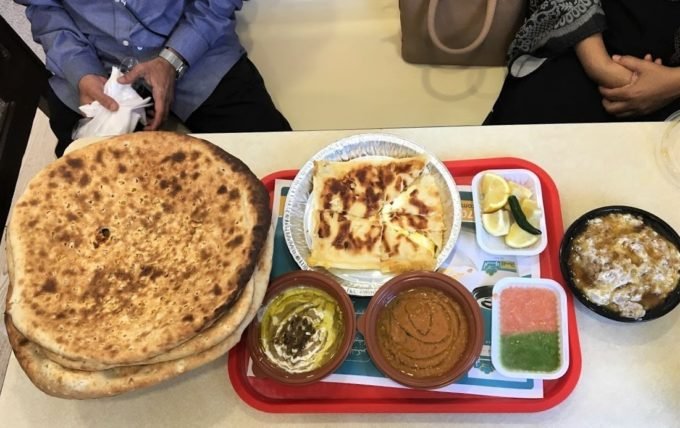
Over Breakfast, Hoping for Small Changes in Saudi Arabia

Over Breakfast, Hoping for Small Changes in Saudi Arabia
Ful Tameez in Jeddah
Walking into Abu Zaid after many years felt strange, but it started to feel familiar soon enough. When I went there with family as a child, we would hunt for a table inside one of the cubicles—while my father went to place our order at the counter.
Covered cubicles in restaurants are prevalent across the Kingdom. Gender segregation is the status quo, be it at restaurants, weddings, schools, or offices. But these cubicles are also a manifestation of the ideal of family privacy that underpins life here. (The exceptions are high-end restaurants, which don’t have cubicles, and 5-star hotels, which don’t have segregated sections. In these spaces, the rules are bent to accommodate Jeddah’s large foreign population.)
At Abu Zaid, the dining booths are behind swinging, saloon-like wooden doors, separating families from one another. The concept of segregation is hard to grasp when one is young, so my sisters and I, along with other kids, had a merry time pulling, pushing, and kicking the doors. Often, we would kneel on the bench trying to peep inside the neighboring cubicle, or find another kid peering into ours.
Nothing has changed since then—except now, we are on the other side of the cubicle doors, glaring at the rowdy kids as we try to eat in peace.
Abu Zaid (‘father of Zaid’) is a popular breakfast spot in Jeddah. Its signature dish, ful tameez, is an everyman’s staple: a large flatbread (tameez) and mashed beans (ful), costing 4 riyals (US$1). People of all socio-economic classes in Saudi Arabia eat it. Here, food is cheap, and while there is steep inequality in other spheres of life, meal times can bring out a sense of solidarity.
As we waited for our ful tameez, I could see families pouring in, hoping to eat before the restaurant closed for Friday prayers—men rushing to the counter, while women and children settled into the cubicles. Many families come here, but in visibility, voices heard, and interaction, women take the back seat. Abu Zaid, like most public spheres, is a male space.
But there are changes afoot. Economic and social reforms are coming, including long-promised women’s rights initiatives, under 32-year-old Crown Prince Mohammad bin Salman’s “KSA Vision 2030”. In fact, the Crown Prince just returned from an international PR campaign and charm offensive, promising the world’s leaders a modern, open Saudi Arabia. But there is good reason to worry that his reforms will only be cosmetic, and that he will be as intolerant of dissent as his predecessors. Many young Saudi Arabians are optimistic, but women’s rights activists less so: they question the government’s commitment to women’s and human rights—particularly after the uncalled-for crackdown on women’s rights activists for “suspicious contact with foreign parties” in May 2018.
Still, some reforms—greater participation of women in the workforce, women getting the right to vote, the haya (morality) police losing their power to harass and arrest people, and the relaxation of the male guardianship law—provide a glimmer of hope.
As I devoured the last bite of the crispy tameez dipped in ful, I allowed myself to feel hopeful for what was to come. Maybe one day, Abu Zaid will no longer have cubicles.